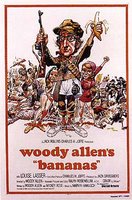Bananas
 Despite its title, this is a film with barely a banana in sight: indeed, Woody Allen's Bananas is concerned above all with way in which representations are so dislocated from referents that they are now effectively autonomous.
Despite its title, this is a film with barely a banana in sight: indeed, Woody Allen's Bananas is concerned above all with way in which representations are so dislocated from referents that they are now effectively autonomous.Opening and closing with scenes in which TV commentators incongruously narrate first death and then sex, Allen's film is a series of comments on commentary. Its absurd comedy derives mostly from a disconnect between what is said and what is done.
Little else unites the otherwise fragmented and episodic plot, which takes Allen's character Fielding Mellish from his job as bumbling consumer products tester to vigilante to political activist to (briefly) stand-in surgeon, analysand (and Christ figure), and then on to guerrilla, tin-pot president, treason defendant, and finally over-scrutinized groom.
Early on, for instance, we hear a salesman from the company for which Mellish works extolling the virtues of the "Execuzisor," a contraption designed to provide exercise for sedentary executives, while in the background we see Mellish demonstrating (despite himself) the worthlessness of the invention. Later, Mellish's best efforts to conceal his purchase of a pornographic magazine are undone by a shop assistant blithely calling out to a colleague "Orgasm, this man wants to buy a copy. How much is it?" Walking down the street, Mellish's apparent helpfulness in guiding a driver seeking to parallel park leads him, unconcerned, to engineer the car's collision into another parked car. And of course the sex-obsessed Fielding's rapid politicization is driven by no real concern for the downtrodden of the Third World, but by his desire to bed the young "women's libber" Nancy.
Latin America is the focus for the middle third of the film. Nancy has stopped by Mellish's apartment with a petition calling on the US government to break relations with the dictatorship of San Marcos, and upon breaking up with her Mellish goes down there to prove himself. But this Latin America is very far from being any index of the real. This Latin America is a mediatized creation of clichés exaggerated into absurdities.
So, for instance, the notion that "power corrupts" is presented in terms of the newly-installed guerrilla president declaring that San Marcos's official language will henceforth be Swedish, and that its citizens will be required to change their underwear every half hour--and to sport their underwear over their other clothing so that obedience to this edict can be monitored.
 And when Mellish is in turn drafted in as leader, he is provided, or provides himself, with an outlandishly fake Castro-ite beard and moustache. Greeted on his state visit to the US by an official on the airport tarmac, an attendant interpreter "translates" the ensuing conversation by simply repeating everything that is said word for word.
And when Mellish is in turn drafted in as leader, he is provided, or provides himself, with an outlandishly fake Castro-ite beard and moustache. Greeted on his state visit to the US by an official on the airport tarmac, an attendant interpreter "translates" the ensuing conversation by simply repeating everything that is said word for word.And indeed the point here is that such mediations are at best comical nonsense, at worst disturbingly callous trivializations. What's lost in all these (inevitably) failed representations is any sense of the affect proper to experience. That affect is either ignored or sanitized or packaged into conventionalized sentiment. That goes as much for the left-wing activist's thoughtless romanticization of what Nancy takes to be a guerrilla revolutionary as it does for the News at Six's turning foreign affairs into another sensationalized banality, interspersed with priests advertising "New Testament" cigarettes.
But there's no outside in Allen's film. Bananas is, in this sense, properly postmodern according to Fredric Jameson's definition of postmodernity as the definitive colonization of nature by culture, such that the two are now absolutely indiscernible. There's also, then, little in the way of political critique: simply a shotgun assault on representation from within what is just another, self-consciously grotesque, instance of precisely the same representational strategies that are under fire.
San Marcos is, in Woody Allen's vision, the only Latin America we have left. The only alternative to (mis)representation is to take its distortions to their (un)natural limit. To show how the media now ventriloquize the corpse of what was once the Third World.

Labels: comedy, self-referentiality
